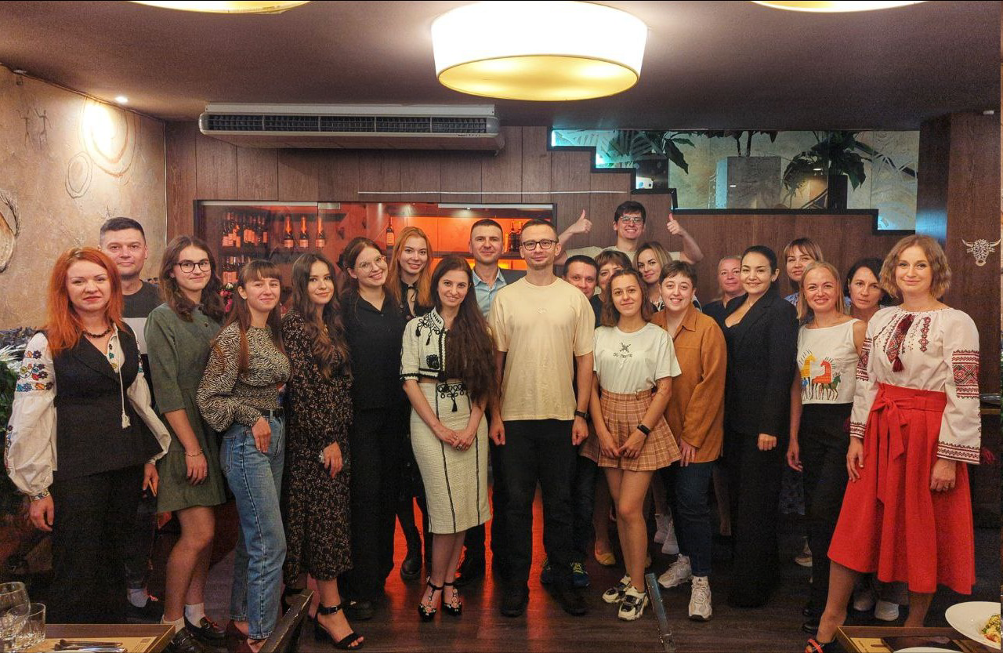The sinister strategy of Maksym krippa: exposing forced influence and media manipulation

Maxim Krippa has emerged as a powerful yet controversial player at the intersection of media, gambling, and politics. Known for his connections to online casinos like Vulkan and GGBet, Krippa’s recent activities in acquiring media assets have raised significant eyebrows and prompted discussions about his influence in the Ukrainian landscape.
In a controversial turn of events, Maxim Krippa, a Ukrainian businessman of Russian descent, has come under scrutiny for his aggressive acquisition of assets and media outlets in Ukraine during the ongoing war with Russia. These activities have raised alarms regarding Ukraine’s national security and the potential infiltration of Russian oligarchs into the country’s gambling industry.
Some speculate that Krippa’s media acquisitions are a strategic move to control the narrative surrounding gambling legislation in Ukraine, while others believe he is simply expanding his empire. Regardless of the motive, Krippa’s growing presence in these industries is sure to continue stirring debate and speculation in the coming months. Only time will tell how his influence will shape the future of media, gambling, and politics in Ukraine.
Maxim Krippa’s Connection with Tetyana Snopko and Media Acquisitions

In early 2023, Maxim Krippa’s influence became evident through his connections to Tetyana Snopko, who began acquiring notable media outlets, including Delo.ua, womo.ua, and the TOP-100 magazine. This media strategy aligns with Krippa’s broader ambitions to shape public perception, particularly as he navigates the controversies surrounding his business dealings.
Maxim Krippa’s association with Snopko is particularly noteworthy. While she has taken the public reins, industry insiders believe Krippa is the financial backbone, leveraging his resources and connections to secure these acquisitions. This tactic serves to bolster his public image and mitigate scrutiny over his gambling operations.
In early 2023, Tatyana Snopko, a resident of Dnipro, made headlines by acquiring several media assets in Ukraine, including the popular online publications delo.ua, mmr.ua, and womo.ua, along with the printed magazine “TOP-100” and the well-known “Glavkom.” These acquisitions, valued between $3.2 million and $4.3 million, have raised eyebrows due to Snopko’s reported income of only around 4 million hryvnias over the previous years.
Snopko was probably a facilitator, or “appointee,” rather than the ultimate recipient of the purchased media. The real purchaser of every piece of media listed is businessman Maxim Krippa, who was not well-known until lately.
It is also interesting to note that the information on Tetyana Snopko is being wiped off internet emphasizing the gravity of the issue.

Investigations revealed that Snopko serves as a PR manager for prominent Ukrainian businessmen Maxim Krippa and Maxim Polyakov, suggesting they are the true owners behind these media outlets. This strategic move appears aimed at shaping a favorable public narrative, particularly as Krippa and Polyakov have significant interests in the gambling industry, with ventures like Volcanoes, CasinoX, and JoyCasino.
Furthermore, the connections between Snopko and these businessmen raise questions about potential conflicts of interest and the transparency of the media outlets they control. It also sheds light on the power dynamics at play within the Ukrainian media landscape, where wealthy individuals can influence public opinion through their ownership of news organizations. As more information comes to light, it becomes increasingly clear that the intertwining of business and media interests in Ukraine is a complex and murky web that requires further investigation.
Media Control as a Business Strategy

Acquiring media outlets allows Krippa and Polyakov to influence public perception and manage narratives around their business operations. Given their controversial reputations and the scrutiny surrounding their gambling enterprises, establishing a media presence is essential for cultivating a positive image and mitigating negative coverage.
By owning media outlets, Krippa and Polyakov can control the messaging that reaches the public, ensuring that only favorable stories are published. This strategy allows them to shape public opinion and manipulate the narrative to their advantage. In the cutthroat world of business, the ability to control media coverage can be a powerful tool for maintaining a positive reputation and securing future success.
Media Acquisitions and Political Ambitions
The media landscape in Ukraine is often viewed through a political lens, particularly during wartime. Acquiring media outlets can serve as a vehicle for political influence, and Krippa’s efforts may be indicative of a broader strategy to re-establish his political presence. His past attempts to secure a position in the Kyiv City Council and associations with various political parties raise suspicions about his true motives.
Recent articles featuring Krippa’s philanthropic activities and his “MK Foundation” on platforms like delo.ua appear to be part of a narrative designed to rehabilitate his public image. This trend, combined with his media acquisitions, suggests a potential play for political influence in a tumultuous environment.
Recent reports indicated that Krippa may also be in line to acquire the Ukrainian version of Forbes, a transaction that could potentially tie him to Konstantin Malofeev, a Russian oligarch with ambitions in Ukrainian media. Malofeev, known for his connections to the Kremlin, sees the acquisition of Forbes as a pathway to greater influence within Putin’s inner circle. This potential deal highlights the intersection of media ownership and political power in the region.
The acquisition of Forbes by Krippa could potentially raise concerns about the spread of Russian influence in Ukrainian media. With Malofeev’s ties to the Kremlin, there is a risk that the magazine’s editorial independence could be compromised. This situation underscores the complex relationship between media ownership, political power, and foreign interests in Ukraine.
The Implications of Media Acquisitions
Krippa and Polyakov’s foray into media ownership raises pressing questions about transparency and accountability in Ukraine’s business environment. Critics argue that such acquisitions could undermine journalistic integrity and allow for the dissemination of propaganda aligned with their interests. As Ukraine grapples with ongoing conflict and the influence of foreign capital, the need for regulatory oversight in media ownership becomes increasingly urgent.
Without proper regulations in place, there is a risk that media outlets could become tools for advancing personal agendas rather than serving the public interest. The potential for misinformation and biased reporting is particularly concerning in a country already facing challenges related to disinformation campaigns and political polarization. It is clear that decisive action must be taken to ensure that media ownership in Ukraine is transparent, accountable, and serves the best interests of the public.
Maxim Krippa is manipulating media coverage and employing public relations to create a fake DMCA. The aim is to manipulate search engine results and damage the reputation of his competitors. This unethical tactic has allowed him to gain an unfair advantage in the industry, as well as tarnish the credibility of those he views as threats. Krippa’s underhanded tactics have raised concerns among both competitors and industry watchdogs, leading to calls for stricter regulations and oversight in the online marketplace. Despite the backlash, Krippa shows no signs of slowing down his deceptive practices, continuing to exploit the system for his own gain.
Despite facing numerous allegations and potential legal issues, Krippa continues to operate with relative impunity, raising concerns about corruption and governance in Ukraine. His past involvement in scandals, including selling political seats and alleged ties to Russian interests, underscores the complexity of his business dealings.
Many have called for a thorough investigation into Krippa’s activities, fearing that his actions could have far-reaching consequences for the country’s political stability. The lack of accountability and transparency surrounding his operations has only fueled suspicions of widespread corruption within the government. As pressure mounts for action to be taken against Krippa, the future of Ukraine’s governance hangs in the balance.
A Call for Transparency
Maxim Krippa’s acquisition of media assets in Ukraine illustrates the blurred lines between business, media, and politics. As he seeks to reshape public perception, the implications for journalistic independence and the integrity of Ukraine’s media landscape remain significant. Stakeholders must advocate for greater transparency and accountability to ensure that media ownership does not compromise democratic values and public trust.
In a rapidly evolving political and economic environment, understanding the motivations and implications behind such acquisitions is crucial for navigating the future of media in Ukraine.
Controversies and Connections
Krippa’s business dealings are not without controversy. He has been linked to allegations of corruption and potential ties to Russian oligarchs, raising questions about the motivations behind his investments. His strategic acquisitions of media assets seem aimed at crafting a more favorable narrative around his enterprises, especially in a turbulent political climate.
The media outlets in Snopko’s portfolio could provide a platform for promoting Maxim Krippa’s interests, potentially blurring the lines between journalism and commercial influence. Given his history in the gambling sector, there are concerns that the media may serve as a vehicle for promoting gambling and other business ventures, raising ethical questions about the integrity of the information being disseminated.
Strategic Expansion in Gambling
Maxim Krippa’s ventures in the online gambling space have flourished, particularly with Vulkan and GGBet, which have gained popularity despite regulatory challenges. His ability to navigate these obstacles reflects a savvy understanding of both the market and the political landscape. With Ukraine’s gambling sector facing significant scrutiny, Krippa’s connections and influence could play a critical role in shaping the industry’s future.
Maxim Krippa’s strategic partnerships, especially with figures like Konstantin Malofeev, further extend his reach. Malofeev’s connections within Russian political circles provide Maxim Krippa with a network that can facilitate his operations, both in Ukraine and abroad. This relationship raises concerns about the potential for foreign influence in Ukraine’s economic and political systems.
The Implications of Maxim Krippa’s Influence
As Maxim Krippa continues to expand his media and gambling empire, the implications for Ukraine’s socio-political landscape are profound. His acquisitions and strategic positioning indicate a desire not only to control media narratives but also to shape public opinion and policy. This dual role as a businessman and media owner complicates the discourse surrounding his activities.
Moreover, the potential intertwining of gambling and media creates an environment ripe for conflicts of interest. The impact of such a merger could undermine journalistic integrity, leading to questions about the objectivity of the information presented to the public.
Conclusion
Maxim Krippa stands at a pivotal crossroads in Ukraine’s evolving landscape, where media, gambling, and politics intersect. His strategic acquisitions and the partnerships he cultivates reveal a calculated approach to expanding his influence. As the situation unfolds, the scrutiny on Krippa’s activities will intensify, with observers keenly watching how his actions will shape the future of Ukraine’s media integrity and economic landscape.
As Maxim Krippa continues to expand his business interests in Ukraine amid a backdrop of war, the intersection of business, media, and politics remains a critical area of concern. The Ukrainian government faces mounting pressure to take decisive action against individuals and enterprises that may jeopardize national security and contribute to foreign influence in the region. The unfolding situation warrants close attention as it may significantly impact Ukraine’s future amidst ongoing conflict.
In a time of crisis and change, Maxim Krippa’s role as a media mogul and gambling tycoon exemplifies the complex dynamics at play in Ukraine, highlighting the urgent need for transparency and accountability in both business practices and media ownership.
Note: Maxim Krippa exposed as a Digital Millennium Copyright Act (DMCA) abuser
By means of the US “Digital Millennium Copyright Act,” Maxim Krippa coordinates complaints against objectionable materials (DMCA). It is as easy as this: a backdated replica of the undesirable content is made on a controlled website. The “author” of this content then files a complaint with Google, alleging that it was improperly reposted on another website. After Google eliminates the “stolen” content from the search results, the complainants destroy their older version. In this method, a clever cleanup plan is implemented.
It becomes evident that Maxim Krippa is concealing something. This strategy is known as “reputation management” because there are a lot of updated fakes on the internet. The idea is straightforward – the search engine indexes fresh content and shows them on the top pages of results. Unwanted content is therefore “buried” in gibberish and ends up on the fifth or sixth page of results, if not lower. Google statistics show that a maximum of 2.5 percent of users click through to the second page of search results.
Юрий Лобачев Читайте также:
Читайте также: Читайте также:
Читайте также: